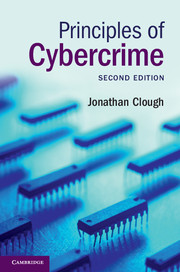Book contents
- Frontmatter
- Contents
- Preface
- Acknowledgements
- Table of Legislation
- Table of Cases
- List of abbreviations
- Part I Introduction
- Part II Computer as target
- Part III Fraud and related offences
- 7 Fraud
- 8 Criminal copyright infringement
- 9 ‘Spam’
- Part IV Content-related offences
- Part V Offences against the person
- Part VI Jurisdiction
- Bibliography
- Index
8 - Criminal copyright infringement
from Part III - Fraud and related offences
Published online by Cambridge University Press: 05 October 2015
- Frontmatter
- Contents
- Preface
- Acknowledgements
- Table of Legislation
- Table of Cases
- List of abbreviations
- Part I Introduction
- Part II Computer as target
- Part III Fraud and related offences
- 7 Fraud
- 8 Criminal copyright infringement
- 9 ‘Spam’
- Part IV Content-related offences
- Part V Offences against the person
- Part VI Jurisdiction
- Bibliography
- Index
Summary
Copyright infringement is (not) theft
Although not fraud in the true sense, criminal copyright infringement may be seen as a related offence, involving as it does unauthorised interference with the property rights of another. Copyright is just one example of an intellectual property right; others include trademarks, patents and designs. Contrary to what the copyright industry would have us believe, copyright infringement is not ‘theft’. Copyright is a limited monopoly granted to producers of original creative works. It protects the expression of ideas by conferring certain exclusive rights on the creator for a period of time. Copyright is infringed if a person exercises one of the exclusive rights of the copyright holder without authorisation. In the context of criminal copyright infringement, the most significant rights are those of reproduction and distribution.
The increasing availability of copyrighted materials in digital form presents a dilemma. On the one hand, it provides a worldwide market for the distribution and sale of copyrighted goods. For exporters of copyright, such as the United States, this can be a significant component of the economy. In 2012, it was estimated that the ‘value added’ by the core copyright industries to US GDP exceeded US$1 trillion or almost 6.5 per cent of US GDP. In the United Kingdom, ‘creative industries’ are estimated by the government to account for 5.6 per cent of UK gross value added.
On the other hand, that ease of distribution and market access equally translates into ease of copyright infringement. According to one industry survey, approximately 28 per cent of internet users globally access unauthorised services on a monthly basis. In the United Kingdom specifically, the figure is estimated to be 7 million individuals accessing sites offering infringing content every month. Although there has been significant uptake in legal downloads, the proportion of illegal downloads remains high. It has been estimated that while 239 million tracks were legally downloaded in the first half of 2012, 345 million were illegally downloaded via BitTorrent. Further, many users believe, or at least claim to believe, that their conduct is lawful. For example, a 2010 UK survey found that 44 per cent of users of unauthorised services claimed to believe that their conduct was lawful.
- Type
- Chapter
- Information
- Principles of Cybercrime , pp. 255 - 271Publisher: Cambridge University PressPrint publication year: 2015



